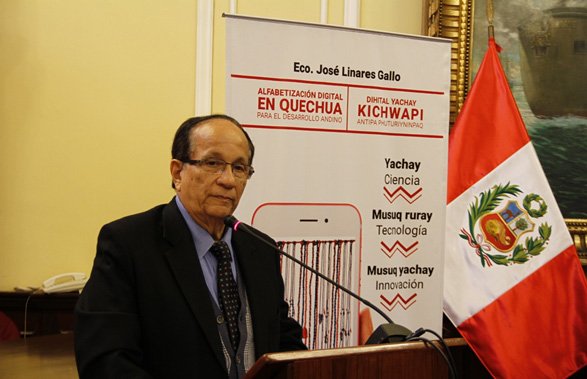The book «Digital Alphabetization in Quechua» by José Linares Gallo was presented in an event carried out in the Miguel Grau Hall of the Congress of the Republic of Peru.

The book «Alfabetización Digital en Quechua» (Digital Alphabetization in Quechua) by José Linares Gallo was presented in an event carried out in the Miguel Grau Hall of the Congress of the Republic of Peru. The main objective of the book is to include technological terms in Quechua.
The ceremony was led by the Congressman Horacio Zeballos Patrón, from “Frente Amplio” (Broad Front party), who commended the academic and intellectual effort in making the book, which would help to synchronize the Quechua language with the progress of the contemporary technology.
Likewise, the book is aimed to communicate about the vulnerable situation that our native languages are facing before globalization and technological revolution.
During the presentation of the book, it was also highlighted the continuity of the language through the time and the need to revalue it. «At the beginning, the geographic difficulties were used as an excuse for this technological exclusion, that at the same time led to economic consequences. Now it is the time to reverse this situation. And as the translator Demetrio Túpac Yupanqui said, it is not the time to just speak about Quechua but to do things with Quechua», said the legislator.
It is important for our institution to emphasize the progress that the creation of this book represents in the educational process promoted for many years.
The digital alphabetization in Quechua is a very relevant work in areas where mining activity is intense. It is well known that communication, negotiation and collaboration processes among miners require a development as horizontal as possible. Sometimes, this scenario is not possible due to cultural, linguistic and educational differences.
The Chamber of Mines of Peru considers that works as the one from the former senator Linares Gallo will contribute decisively to the training of professionals that work in these mining areas, whether in greenfield or any other kind of mining activity.
It is also expected that the interaction among companies, workers and communities improves with the use of technological common terms. This will lead to the collaboration between mining professionals and community members that use Quechua as their first language.
During his participation, the former senator Jose Linares Gallo established that the goal was to make a renewal and a digital alphabetization of the Quechua language. It has been hibernating for 500 years. «Terms related to technology have never been created in Quechua. This proves that the Andean communities have been living with their backs turned to all technological development, up to date», he said.
Linares Gallo also mentioned that this product is a result of the effort and work of many people from the Andean Communities over a number of years. They looked for residents in many places and gave them answers to create technological terms together. This way, linguistic records have been collected, at first to line up with the industrial era, then to the analogical one and finally to the digital era.
It is important to mention that after many years the Ministry of Education of Peru has decided to redeem the Quechua language. For this reason, it considers that children have the right to start their studies with their native language. One of the objectives is that children have their native language at the beginning with a Quechua language including technological terms.
The book author finished by inviting everyone to work on a digital alphabetization of the Quechua language. Besides, he mentioned that China is a country with 1300 million of inhabitants along with 300 languages, even writing, where all of those languages have passed through Mandarin Chinese, similar situation happened in India and other countries.
«Nowadays there are tools such as mobile phones that allow us to send and democratize culture and information, and this is changing the country. They currently help us to find information published online, obtain information that can be translated into Quechua, and find ways to join phonemes in order to give technical content.
Finally, the legislator Zeballos highlighted the work performed by our institution through its educational digitalization work for the mining sector.
Jose Linares Gallo, the book author and former senator, and the translator Demetrio Túpac Yupanqui participated in this event. As well as the specialist Nicanor Loayza and Gregorio Durand, president of the National Confederation of Parents (CONAPAFA).